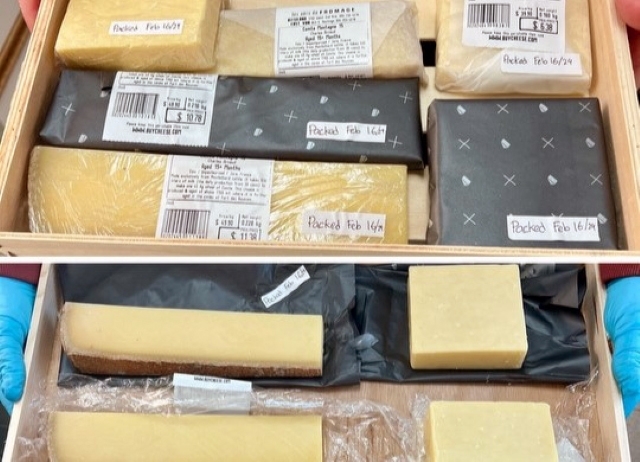When we have done group cheese tastings in the past, one of the questions that comes up the most often is how to preserve and care for cheese.
That is an excellent question because cheese is a pricey item, and it's a shame to waste cheese by not protecting it. I always think of everyone who worked hard to make the cheeses we enjoy. I think of the farmer who cared for and milked the animals, the cheese maker who made and aged the cheese, and then all of the people responsible for its care on the long journey the cheese took to get to us here on the West Coast. I want to respect their work by caring for the cheese they produce as carefully as possible, and I want everyone else to have the same tools to make their cheese last as long as possible so that none is wasted.
First, cheese needs to be stored in the fridge. I think we have an idea that they don't keep cheese in the refrigerator in Europe and that leaving it on the counter for days is okay. That just isn't so.
In winter, our houses are heated, and in summer, they probably aren't air-conditioned, so the temperature is not only warm but fluctuates a lot throughout the day. Just like for wine, temperature variance is no friend to cheese. Leaving cheese out of the fridge for more than four or five hours isn't good. It will just spoil faster.
Leave your cheeses in the fridge for a couple of hours before serving. I usually leave soft cheeses out for 2 – 3 hours and hard cheeses out for about an hour. If you leave firm cheeses out too long, they get sweaty on the cut surface.
There is a debate over whether plastic wrap or paper is better for cheese. They are both equally excellent and imperfect.
If you buy a piece of cheese and it is wrapped in plastic, it should last a few weeks kept that way. Once you unwrap it, you must wrap it in a brand-new cling film or plastic wrap, or else the cheese will no longer be protected. This style of wrap doesn't reseal once you've opened it, so if you put it back in that same piece and bundle it into your fridge, it will dry very quickly. Ideally, you would get a fresh wrap and rewrap it every time you open that cheese. If you do, a few weeks in your fridge is realistic. If you rewrap it in the same piece it came in, the cheese will probably start getting dry before the end of the week.
Cheese paper has a few great points and drawbacks. For people trying to cut down on the amount of plastic they use, many (although not all) of the brands of cheese paper you can buy are biodegradable or compostable. Some of them are even reusable.
Now for the wrapping. If the piece is wrapped well, it should last like a piece of cheese wrapped in plastic. However, some people like wrapping presents better than others. If the piece isn't wrapped tightly, with the edges tucked in, you may have a piece of cheese that will dry quickly in your fridge.
To combat that, or your not-resealed plastic wrap, you could keep your wrapped cheese in a glass or plastic container with a tight-fitting lid. One more layer of protection won't hurt.
I always try to balance the cost of the plastic or paper with the price of the cheese. People say they don't want to waste plastic by wrapping a piece up in new cling film when it's already in a piece. Although I understand the sentiment, how much did that 10-inch piece of plastic wrap cost compared to the price of the cheese you're trying to preserve? I'm guessing the cheese cost a lot more.
The only thing that I don't like about preserving cheese is vacuum-sealed packing. Even though you have sucked all the air out of the packaging, the cheese is still aging. You haven't stopped that process. It's also tricky to not crush the cheese while removing the air from the packaging. If you have cheese with small eyes throughout, there's a good chance that it will look like it has a smooth paste when it comes out of a vacuum-sealed bag.
Vacuum sealing is especially terrible for soft and washed rind cheeses. It would be better to take your chances by keeping it in your fridge in paper or plastic wrap; indeed, buying more frequently is the best option.
We recently experimented with the store. We saw a post that a company had made, showing how much better their cheese paper kept cheese than saran wrap /cling film. The post showed a picture of two pieces of cheese, one in plastic and one in cheese paper. They claimed the cheeses had been wrapped for two weeks, and I thought the picture they showed was skewed in their favour. It looked apparent they had not used two equally fresh pieces of cheese when they started the two weeks.
It prompted me to test how cheese would fare if we cut fresh pieces and how long they would last nicely in the fridge.
We used three pieces of freshly cut Comté and three pieces of Cheddar for our experiment. We wrapped one in reusable cheese paper, one in cling film and one in slightly waxed scale paper sheets.
We put them in our fridge and left them for nineteen days.
Both the cling film and the cheese paper looked pretty much identical. The pieces we had wrapped in scale paper were somewhat dried out. Perhaps if we had given them a home in a plastic or glass container, they would have lasted better, but we treated all six pieces the same. The picture accompanying this article shows our results. It shows that whichever covering you prefer is fine if the cheese is carefully wrapped.
Another thing that isn't a friend to cheese is the freezer. My rule of thumb is that if you cook with it, it should be fine kept in the freezer for a month or two, but if you are going to serve it on a cheese board, never mind freezing it.
Freezing tends to remove some of the moisture from cheese. If you freeze soft cheese with a higher moisture content than firm cheese, you will end up with a crumbly, slightly soggy cheese—nothing that you would be happy to serve or eat yourself. If you have a few chunks of Cheddar or some grated Reggiano around and you're worried about them getting mouldy, then popping them in your freezer for a recipe of mac n cheese in the future is just fine.
I'm always sad to see cheese being thrown away, so I hope some of this information will help you enjoy your cheese and keep it longer.

 quicksearch
quicksearch




